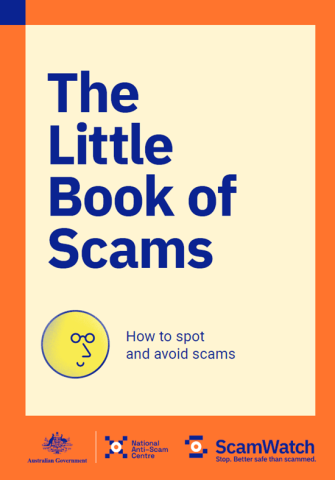On this page
How to talk to a loved one you’re worried is being scammed
Having a conversation with a friend or family member about a potential scam can be difficult, but it’s a very important part of looking out for our loved ones.
These conversation starters should make talking about scams with a loved one easier, without causing defensiveness or embarrassment. Choose what feels most natural for your relationship and situation.
We can help you navigate from gentle inquiry all the way through to more direct intervention when necessary.
Before you start any conversation
These principles will help you approach sensitive conversations in a way that builds trust rather than creating defensiveness.
- Choose a private, relaxed moment.
- Lead with care and concern, not judgment.
- Listen more than you talk.
- Ask questions rather than make statements.
- Be prepared for them to not want to discuss it initially.
Opening the conversation
Starting the conversation well sets the tone for everything that follows. Choose an approach that feels natural and non-threatening.
General concern approach
Use when you want to show care without sharing your suspicions.
“I’ve been thinking about you lately, and I just want to make sure you’re doing okay with everything going on in your life.”
“You know I care about you, right? I’ve noticed you seem stressed/excited/different lately, and I want to make sure you have support if you need it.”
“I love how trusting and generous you are, but I worry about you sometimes. Can we talk about how to make sure people don’t take advantage of that?”
Learning together approach
Use when you want to share information without directly accusing.
“I just heard about some really sophisticated scams on the news. Have you heard about any of this stuff? I’m worried I wouldn’t even recognise them myself.”
“My friend’s mum almost became a victim of a really elaborate scam - it was so convincing! It made me realise how hard these things are to spot. What would you do if someone contacted you claiming to be from the bank?”
“I’ve been reading about online safety. Some of these scams are incredible - they’re using AI voices now! How would we know if we came across anything like that?”
Romance scam concerns
Romance scams rely on emotional manipulation, so these conversations require extra sensitivity around matters of the heart.
Gentle inquiry
“You seem really happy about this new person in your life. Tell me more about how you two met.”
“It sounds like this relationship is moving pretty fast. How are you feeling about everything?”
“I’m excited that you’ve found someone special. Have you been able to meet up in person yet? What are they like in person?”
Sharing experience
Use when you want to share information without directly confronting.
“Online dating can be tricky. I’ve heard some wild stories. What’s your experience been like?”
“A friend of mine had someone ask her for money early in an online relationship. Has anything like that come up for you?”
Safety focus
“I just want to make sure you’re staying safe with online dating. What kind of safeguards are you taking?”
“Have you been able to verify that this person is who they say they are? It might sound paranoid, but I’ve heard stories…”
Financial or investment scam concerns
Money conversations can feel intrusive, so approach financial topics with genuine curiosity rather than immediate scepticism.
Curious interest
“You mentioned a new investment opportunity. I’m curious about it - can you walk me through how it works?”
“This financial opportunity sounds interesting. Have you been able to research the company independently?”
“What made you decide to get involved with this investment? I’d love to understand it better.”
Increasing concern
“I worry about financial scams targeting people at the moment. How do you usually check that investment opportunities are legitimate?”
“Before you invest any more money, could we look at this together? I’d feel better knowing you have a second pair of eyes on it.”
“I love that you’re looking for ways to improve your financial situation. Can we make sure this is as safe as it sounds?”
Communication and contact concerns
Unexpected contact from official-sounding sources is a common scam tactic that deserves gentle questioning.
About unexpected contact
“You mentioned getting a call from [bank/government agency]. Did you initiate that contact, or did they call you out of the blue?”
“That text message you showed me looked pretty official. Did you contact them directly to verify it was real?”
“I’ve been getting a lot of spam calls lately. Have you been getting anything like that?”
About urgent requests
“They’re asking you to act pretty quickly on this. Does that feel normal to you, or does it seem rushed?”
“When someone contacts me with urgent requests, I always get suspicious. How are you feeling about the timeline they’ve given you?”
When you need to be more direct
Sometimes subtle approaches aren’t enough, and you’ll need to express your concerns more clearly whilst still showing care.
Expressing specific concerns
Use these when subtle approaches haven’t worked and you’re genuinely worried.
“I care about you too much not to say this. I’m worried that someone might be taking advantage of your generous nature. Can we talk about what’s been happening?”
“I need to share something that’s been weighing on me. Some of the things you’ve described sound like patterns I’ve heard about in scams. I could be wrong, but can we look at this together?”
“I’m scared that someone is trying to hurt you financially. I know you might not want to hear this, but I think we should double-check what’s going on.”
Asking for permission to help
You can use these when asking your loved one if you can check and research to help them.
“Would you be open to letting me help you research this person/company/opportunity? I just want to make sure you have all the information.”
“Could we call [bank/company/agency] together from their official number just to verify this is legitimate? It would make me feel so much better.”
“I know this might sound overprotective, but would you be willing to pause any money transfers until we can verify this is safe?”
What not to say
Some words and approaches can shut down communication. It’s important to avoid language that creates shame or defensiveness.
Try to avoid:
- “You’re being scammed”. This is too direct and can create defensiveness.
- “How could you fall for this?”. Can create shame or embarrassment.
- “It’s obviously fake”. This dismisses their judgment abilities.
- “You’re too smart for this”. Can imply they’re being stupid.
- “I told you so”. This is never helpful.
- “Just stop talking to them”. Rarely works and can damage your relationship.
Try instead:
- “I’m concerned about what’s happening”
- “Let’s figure this out together”
- “What do you think about…”
- “How are you feeling about all this?”
- “I want to help you stay safe”
- “Can we look at this from another angle?”
Responding to push back reactions
Scam victims may respond defensively to concerns. Having thoughtful responses ready can help keep conversations productive. It may take many conversations before your messages connect so always try to keep the pathway open for more discussion.
If they say: “You don’t trust me”
You could try: “I know and trust YOU completely. I don’t yet trust the stranger(s) who might be trying to take advantage of your good nature.”
If they say: “You think I’m stupid”
You could try: “I think you’re smart and kind, which is exactly why scammers target people like you. This isn’t about intelligence.”
If they say: “You’re being paranoid”
You could try: “Maybe I am being overcautious, but that’s because I care about you. Can we just double-check together so I can stop worrying?”
If they say: “It’s none of your business”
You could try: “You’re right, and I’m sorry if I’m overstepping. I’m just worried about you because I love you.”
Resources to support your conversation
Scamwatch has a number of resources to help explain more about scams and to hear other people's personal stories.
What to say to someone who's been scammed
I'm Doctor Kate Gould. I'm a scam researcher and a clinical neuropsychologist.
If someone tells you that they have been scammed, that is really somebody saying that they deeply trust you with something very difficult that they've gone through.
So it's important to be non-judgmental, not to blame them, and to be open and curious with what they've gone through and offer practical and emotional support.
[End of transcript.]
Stories and information


When to have follow-up conversations
Timing your ongoing conversations appropriately helps maintain trust whilst making sure your loved one has continued support.
Try talking again:
- After a few days if they seemed receptive but unsure.
- Before any major financial decisions they’ve mentioned.
- If you notice new concerning behaviours from our red flags checklist.
- Regularly but gently if you’re in an ongoing support role.
Guiding them away from the scam
If your loved one is open to your concerns, it’s important to build on that and help guide them away from the scam.
You can suggest:
- “Should we call [the bank/the company] together to verify this?”
- “Would you like me to help you research this online?”
- “Can I help you set up some extra security on your accounts?”
- “Would you be comfortable showing me the messages/emails?”
Ongoing support
“I’m here if you want to talk through any of this stuff”
“Will you keep me updated on how this develops?”
“Can we check in about this again next week?”
Things to remember
One conversation rarely solves everything. It’s often a process that can take time. Be patient and stay the course.
Maintain the relationship. Being right isn’t worth losing their trust.
They may need time to process. Don’t expect instant agreement.
Your safety matters too. Don’t put yourself at financial risk trying to help.
The goal isn’t to win the conversation. You are planting seeds of doubt about the scam while preserving your relationship so you can continue to be a source of support.
See also
You can play a vital role in protecting your loved one from harm if they are involved in a scam. Find out how.
A checklist for concerned friends and family to help identify potential scam situations early.
Intelligence, education, technical expertise and life experience don't protect any of us from sophisticated scammers.



